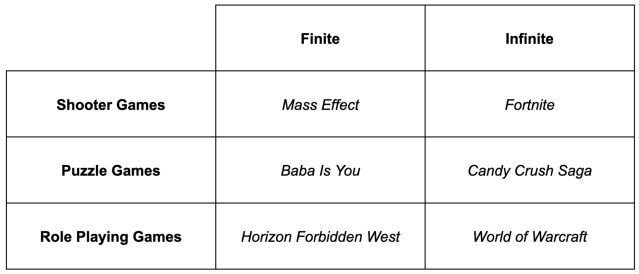Video Game Addiction
Why Some Video Games Are So Hard to Stop Playing
"Infinite" games are designed to keep you hooked.
Updated January 15, 2024 Reviewed by Devon Frye
Key points
- All video games can be considered "finite" or "infinite."
- Video game developers have a financial incentive to make infinite games much harder to stop playing.
- Switching to finite games can help people regain control over their time spent playing video games.
Many video games intentionally include design elements crafted to keep people playing as long and as often as possible. I explained several insidious developer techniques in a previous article. These include strategies taken from slot machines, high-pressure sales strategies, and consumer psychology. However, developers only include these when given a financial incentive.
Across all genres, games can be thought of as either “finite” or “infinite.”
Finite games can be finished. They usually tell a story and provide a self-contained experience with a beginning, middle, and end. When players reach the end of the story, they have completed the game. Although some choose to try the game again in a more difficult mode or continue hunting down secrets they missed the first time, the game is generally over.
Infinite games cannot be won. You will never reach the end of Candy Crush. There are currently more than fourteen thousand levels to complete, with more added frequently. Old-school arcade games often fit this category, as they were designed to last as long as the player kept inserting quarters.

Finite games make money using a traditional model, like products in stores. Developers create a game, advertise it, and sell it to interested fans, which completes the transaction. You can purchase Horizon Forbidden West for $60.
Infinite games use one of a few different but related models. Fortnite adopts the “free to play” model, allowing anyone to play the game while offering optional in-game purchases. World of Warcraft employs the subscription model, which requires gamers to pay for the initial product and an additional $15 per month for continued access.
The highest-grossing finite games have each earned developers between $40 and $50 million. In contrast, the infinite game PUBG Mobile has earned more than $70 million every single month since May 2019. In total, PUBG has grossed more than $5 billion since its release in 2018.
These different business strategies require developers to make strategic choices to maximize revenue. Because finite game studios earn money by selling a complete product, they are incentivized to make a high-quality product and advertise effectively. This allows them to sell as many copies as possible to interested fans and then start to work on the next product. However, this naturally limits revenue; they can only earn as much money as there are interested players.
Infinite games require a different strategy. The longer they can keep players’ attention, the more opportunities the players have to spend money. This means that rather than focusing on creating a complete product, they generally focus on implementing as many psychological tricks as possible.
These include showing gamers how their scores compare to their friends' scores, making players depend on one another so that they feel guilty when not playing, threatening players’ progress when they haven’t opened the game in a few days, and bombarding players with notifications.

Tactics like these naturally make infinite games much harder for players to walk away from. In addition, the “Zeigarnik effect” ensures that incomplete quests will haunt players who want to stop playing the game.
To demonstrate this, I searched online for lists of the most psychologically "addictive" games and combined them here. (Lists: 1, 2, 3, 4, 5, 6, 7, 8)
The sites listed a total of eighteen different games: Minecraft, World of Warcraft, Fortnite, League of Legends, Candy Crush Saga, Counter-Strike: Global Offensive (CS:GO), Apex Legends, The Sims 4, Rust, PlayerUnknown’s Battlegrounds (PUBG), The Elder Scrolls V: Skyrim, Clash of Clans, Path of Exile, Pokémon GO, Runescape, Roblox, Dota 2, and Overwatch.
Seventeen of the eighteen games that players are most likely to describe as "addictive" are infinite. That is, they have a never-ending stream of content with optional purchases. This ensures players (and their wallets) keep coming back to the game. Skyrim, the only finite game on any list, is still so massive that players can explore for hundreds of hours.
Games like these can cause serious problems for vulnerable gamers. For example, limited-time events require players to complete challenges within a few days to earn exclusive rewards.
One of my clients* faced this dilemma recently. Jack’s favorite game announced a New Year’s event for the first week of the year. Those who completed all of the challenges would win a unique set of golden armor to use in the game. Those who failed to finish in time would never be able to receive it. Knowing that players craved this powerful equipment, they designed the last few quests in the list to be nearly impossible to complete in time, hoping that they would pay for powerups to help them.
Jack desperately wanted this armor. He explained that it would make his character powerful enough to climb the leaderboard and impress his friends.
This presented him with a quandary: He would need to log on to check on his characters several times a day and play for many hours. As a busy college student, this was time he could not afford to spend. This left him with three options: Play the game instead of doing his homework, do his homework instead of playing the game, or pay for in-game benefits with real money.
Several of my clients are former college students who dropped out or failed out of school after prioritizing gaming over their studies. Finite games rarely present this kind of problem. When I stop playing Mass Effect for a week, the game waits patiently for me to return. In contrast, the infinite game Clash of Clans would allow others to pillage my town for resources to punish me for neglecting it.

Jack eventually decided to stop playing this predatory game. He didn’t want to stop playing video games altogether, but he recognized the psychological manipulation built into infinite games. When he restricted himself to playing finite games, his grades and social life improved almost overnight.
If you also find yourself skipping homework, work, social time, or sleep in favor of games, reflect on the kind you play. Are they finite or infinite? Do the developers want to entertain you or squeeze money out of you? Are you playing on your schedule or theirs? Switching to finite games can make it easier to find balance in your life.
*This story is a combination of several real-life cases to preserve anonymity.
References
Adair, C. (n.d.) 9 most addicting games in the world. Game Quitters. https://gamequitters.com/most-addicting-games/
Asskoumi, A. (2021, August 18). 10 most addictive video games. The Mindful Gamer. https://themindfulgamer.com/10-most-addictive-video-games/
Azmy, A. (2023, September 11). 7 most addictive games. Game Rant. https://gamerant.com/most-addictive-games/
Chourasia, A. (2022, February 20). Believe it or not, this is what happens when you finish Candy Crush. Essentially Sports. https://www.essentiallysports.com/esports-news-believe-it-or-not-this-i…
Cummings-Grady, M. (2021, June 7). The 9 most addictive video games ever made. Popdust. https://www.popdust.com/most-addictive-video-games-2653269983.html
Fishman, A. (2018, November 30). Why is this game so addictive? Psychology Today Online. https://www.psychologytoday.com/us/blog/video-game-health/201811/why-is…
Fishman, A. (2022, November 7). Why it's so hard to walk away from a video game. Psychology Today Online. https://www.psychologytoday.com/us/blog/video-game-health/202211/why-it…
Ghosh, A. (2018). Internet gaming disorder: Can game theory throw some light? Indian Journal of Social Psychiatry, 34(3). 10.4103/ijsp.ijsp_27_18
Peterson, T.J. (2021, December 30). The 5 most addicting games and how they affect your mental health. HealthyPlace. https://www.healthyplace.com/addictions/gaming-disorder/the-5-most-addi…
Rehabs UK. (2022, December 13). World's most addictive video games revealed, as addiction specialists highlight warning signs. Rehabs UK. https://rehabsuk.com/blog/world-s-most-addictive-video-games-revealed-a…
Smith, C. (2018, November 6). Video game addiction: What are the 5 most addictive games? Addiction Center. https://www.addictioncenter.com/community/video-game-addiction/
Statista. (2024). App revenue generated through PUBG Mobile worldwide from April 2018 to July 2023. Statista. https://www.statista.com/statistics/1079038/pubg-mobile-spending/




